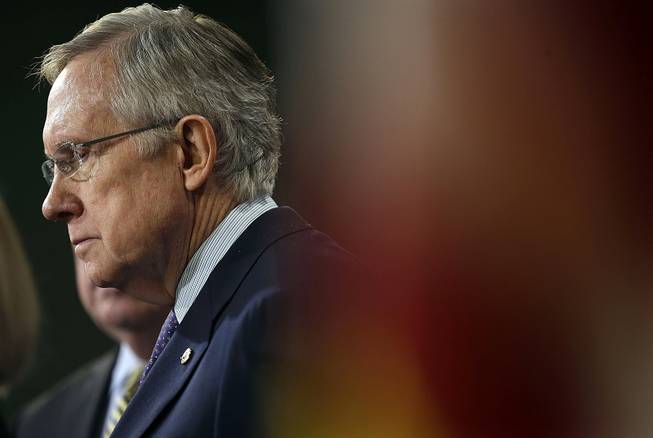
AP Photo/Pablo Martinez Monsivais
Senate Majority Leader Harry Reid listens during a news conference about the budget Thursday, Dec. 12, 2013, on Capitol Hill in Washington.
Friday, Dec. 13, 2013 | 2 a.m.
Nevada’s representatives have almost all testified in recent days that an extension of emergency unemployment benefits is essential to the well-being of the state’s long-term jobless workforce.
Nonetheless, the delegation seems poised to lend the bulk of its support to a budget that will leave unemployment benefits unaddressed, effectively guaranteeing that come the end of December, over 17,000 Nevadans will lose their expected income support, at least temporarily.
Three of Nevada’s four House representatives voted in favor of a two-year budget deal that passed the House by a vote of 332 to 94 Thursday. It replaces about $63 billion of previous, across-the-board sequester cuts with savings from elsewhere in the federal budget and reduces the deficit by about $23 billion over the next 10 years — but does not include a one-year extension of funding to cover emergency unemployment benefits Democrats had hoped it would.
Rep. Joe Heck, R-Nev., was the one holdout — arguing that he couldn’t support the budget deal because it reduced pensions for military retirees.
Even without funding for unemployment benefits, some supporters argued, it was a deal they couldn’t refuse.
“The best way to get people back to work is to create jobs and grow the economy, and have some certainty in the public and private sector,” Rep. Steven Horsford, D-Nev., told the Sun Thursday, defending his decision not to fight harder — or withhold his vote — based on the unemployment benefits issue. “The fact that we have been working from a continuing resolution process every two to three months — it’s bad for the economy … it’s bad for unemployment ... Making this decision, in some ways, will help those individuals get back into the job market.”
Senate Majority Leader Harry Reid, D-Nev., said Thursday that he was “about as disappointed as anyone could be” that unemployment benefits weren’t covered in the budget agreement.
“As you know it’s been extremely difficult procedurally to move things along, and the Republicans were against doing anything [with unemployment] in the House,” Reid said in response to a question about why he didn’t fight harder to include assistance for the long-term jobless in the budget, which the Senate will vote on soon. “It left us, procedurally, without an alternative.”
Yet the Nevada delegation’s apparent resignation to leave the fight over unemployment benefits until another day is about as uncharacteristic as Congress coming to a resolution on a budget issue before a deadline.
In the past, most Nevada lawmakers have backed efforts to, at all costs, make sure unemployment benefits are funded without interruption — or at least without a surefire way to make sure that interruption is really short. There have been impassioned and lengthy campaigns, and Reid has even swallowed deals to offset the cost of emergency benefits — something he doesn’t believe in — to make sure the checks keep coming.
This time, they are optimistic about their chances down the line — but there are no solid guarantees that the emergency jobless benefits, once suspended December 28, will return.
Reid made a promise this week that unemployment benefits for the long-term jobless will be his first priority when Congress returns from its January holiday.
But at that point, there will be no obvious legislative vehicle to which such an extension of unemployment benefits could be attached — certainly nothing like a must-pass budget bill.
That means an extension of unemployment benefits may have to be handled as a standalone issue — something that has been considered too politically risky to do for quite some time.
“The politics of this are pretty strong … this is an issue that Republicans, I think, need more than we need,” Reid said, striking an optimistic note on the potential of an extension — he even said he would try to make the benefits, once restored, retroactive to cover the weeks in which jobless workers might find themselves without assistance. “We are going to get unemployment compensation done no matter how long it takes.”
Within the Nevada delegation, there is support for that take: Rep. Dina Titus, D-Nev., has co-sponsored legislation to extend emergency unemployment benefits, Sen. Dean Heller, R-Nev., has stated publicly that he is in favor of a one-year extension, and Heck signed onto a Republican letter to House Speaker John Boehner this week asking for him to schedule a vote on “a temporary extension of emergency unemployment insurance.”
Even Rep. Mark Amodei, R-Nev., has supported past deals to extend funding for jobless assistance, though he has wondered if a full extension of all tiers benefits is truly necessary.
But the same can’t be said of all Republicans in the House, where, as Reid acknowledged, the opposition to an extension of benefits is most strong.
There are currently four tiers of emergency unemployment insurance available to individuals in the hardest-hit states. Jobless workers in Nevada, as a state with a 9.5 unemployment rate, are eligible for the full complement of benefits, for a maximum of 73 weeks. Once Nevada’s unemployment rate dips below 9 percent, long-term jobless workers will only be eligible for a maximum of 63 weeks.

Join the Discussion:
Check this out for a full explanation of our conversion to the LiveFyre commenting system and instructions on how to sign up for an account.
Full comments policy